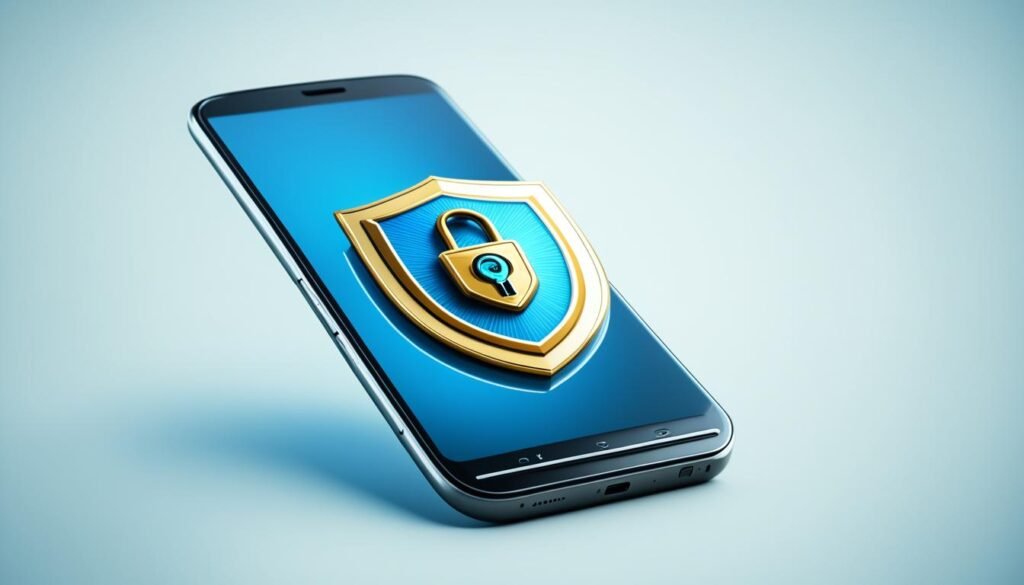Have you ever wondered if your smartphone is really secure? Is someone snooping on your personal information without you even knowing it? With the increasing number of cyber threats and the amount of sensitive data we store on our devices, mobile security has become a pressing concern. In this article, we will explore the secrets of GhostTrack, an advanced mobile security solution that promises to protect your smartphone from prying eyes. Are you ready to take a dive into the world of mobile security and discover how you can keep your personal information safe and secure?
Key Takeaways:
- GhostTrack is an advanced mobile security solution that safeguards your smartphone from potential breaches.
- Mobile security is crucial to protect your personal information and sensitive data.
- GhostsTrack’s state-of-the-art tracking tactics enhance the security of your device and ensure the safety of your data.
- Explore the threats to mobile security and learn how to mitigate them.
- Discover the best practices for mobile security and how they can help you maintain a secure mobile environment.
Importance of Mobile Security
In today’s digital age, ensuring mobile security is crucial to safeguarding your personal information and data. With the ever-growing number of cyber threats, protecting your device from potential breaches is of utmost importance. Mobile security plays a vital role in maintaining the confidentiality, integrity, and availability of your data, preventing unauthorized access, data theft, and other cybersecurity risks.
Mobile security measures are particularly essential due to the extensive use of smartphones, which store a wealth of personal information, ranging from passwords and financial details to sensitive emails and private conversations. Without proper protection, these devices become vulnerable to cyberattacks, putting your privacy and security at risk.
“Mobile security ensures the safety of your data and helps prevent unauthorized access or data theft.”
By prioritizing mobile security, you can confidently use your smartphone for various tasks, such as online banking, shopping, and communication, without compromising your personal information. Through robust mobile security practices and solutions, you can mitigate the potential risks and challenges posed by cybercriminals, thereby preserving the confidentiality and trustworthiness of your data.
When it comes to mobile security, being proactive is key. Implementing security measures not only protects your data but also helps to create a secure digital environment for others. By embracing mobile security practices, you contribute to the collective effort of fostering a safer and more reliable digital landscape for everyone.
Benefits of Mobile Security:
- Protection against malware and viruses
- Secure storage and transmission of data
- Prevention of unauthorized access
- Enhanced privacy and confidentiality
- Safeguarding against phishing attempts
- Secure online transactions
- Defense against network-based attacks
Investing in mobile security solutions empowers individuals and businesses to navigate the digital world confidently, addressing the potential vulnerabilities associated with mobile devices. By prioritizing mobile security, you contribute to building a safer, more trustworthy digital ecosystem.
Now that we recognize the importance of mobile security, let’s delve deeper into the various threats that mobile devices face in the digital landscape and the measures to combat them. Stay tuned for the next section, where we explore the different cybersecurity challenges and their impact on mobile security.
Threats to Mobile Security
When it comes to mobile security, there are several threats that you need to be aware of. It’s important to understand these risks so that you can take appropriate measures to protect your device and personal information.
Malware Attacks
Malware, or malicious software, is a common threat to mobile security. It can be disguised as legitimate applications or files, and once installed on your device, it can cause significant harm. Malware can steal your personal information, spy on your activities, or even take control of your device.
Phishing Attempts
Phishing is a form of cyber attack where attackers trick individuals into revealing sensitive information, such as passwords or credit card details, by pretending to be a trustworthy entity. Phishing attempts are often carried out through emails, text messages, or fake websites designed to mimic legitimate ones.
Insecure Wi-Fi Networks
Using public Wi-Fi networks can put your device at risk. These networks are often unsecured, making it easier for hackers to intercept your data. By accessing your device on an insecure Wi-Fi network, attackers can potentially gain access to your personal information or inject malicious software onto your device.
Unauthorized Access to Sensitive Data
Unauthorized access refers to someone gaining entry to your device or accounts without your permission. This can happen if your device is lost or stolen or if an attacker manages to bypass your security measures. Unauthorized access can lead to the theft of sensitive data, such as financial information or private communications.
To protect yourself against these threats, it’s crucial to implement mobile security solutions that can help detect and prevent such attacks.
| Threat | Description |
|---|---|
| Malware Attacks | Malicious software that can harm your device and steal sensitive information. |
| Phishing Attempts | Cyber attacks that trick individuals into revealing personal information. |
| Insecure Wi-Fi Networks | Unsecured public Wi-Fi networks that can be exploited by hackers. |
| Unauthorized Access | Gaining entry to your device or accounts without permission. |
By understanding these threats and taking proactive measures, you can ensure the safety of your device and personal information.
Secure Communication
Secure communication is a vital aspect of mobile security that ensures the privacy and confidentiality of your conversations. With the increasing risk of unauthorized interception and eavesdropping, it is crucial to employ robust security measures to protect your messages and calls from prying eyes.
Mobile security solutions encrypt your messages and calls, making it nearly impossible for unauthorized parties to intercept or decipher them. By utilizing encryption algorithms, your communication remains secure and inaccessible to anyone trying to breach your conversations.
“Secure communication is the cornerstone of mobile security. By encrypting your messages and calls, you can trust that your conversations remain private and shielded from any potential breaches or eavesdropping.” – Mobile Security Expert
Why is Secure Communication Important?
Not only does secure communication protect your personal conversations, but it also safeguards sensitive information shared during professional or business-related activities. Whether you’re discussing confidential matters or sharing proprietary data, ensuring the integrity of your communication is of utmost importance.
Without secure communication, you risk exposing your personal or professional information to malicious individuals who may use it for malicious purposes. The consequences can range from identity theft and financial loss to corporate espionage and intellectual property theft.
Benefits of Secure Communication
When you prioritize secure communication, you gain several benefits:
- Privacy: Your conversations remain confidential, visible only to the intended recipients.
- Confidentiality: Sensitive information shared during calls or messages stays protected.
- Integrity: The authenticity and accuracy of your communication are preserved.
- Trust: You can have peace of mind knowing that your messages and calls are secure.
By prioritizing secure communication, you can engage in sensitive discussions, share valuable information, and communicate without fear of unauthorized access or interception.
Best Practices for Secure Communication
To ensure the utmost security of your communication, consider the following best practices:
- Use end-to-end encryption messaging apps that prioritize your privacy.
- Verify the authenticity of the person or device you are communicating with.
- Regularly update your messaging apps to benefit from the latest security patches and enhancements.
- Avoid connecting to unsecured Wi-Fi networks and opt for trusted networks whenever possible.
- Be cautious when clicking on links or downloading attachments, as they may contain malware.
By implementing these best practices, you can establish secure communication channels and protect your conversations from unauthorized access.
Mobile Device Management
Mobile device management (MDM) is a critical component of mobile security. It involves the management and protection of mobile devices within an organization, ensuring compliance with security policies, and safeguarding sensitive corporate data. By implementing an effective MDM solution, you can achieve centralized control and monitoring of devices, leading to enhanced security and data protection.
With MDM, you can:
- Enforce security policies: MDM allows you to set and enforce security policies for all mobile devices connected to your organization’s network. This ensures consistency in security measures and reduces the risk of unauthorized access.
- Manage device configurations: MDM provides you with the capability to remotely manage and configure devices, ensuring they meet your organization’s security standards. This includes setting up secure access controls, encryption protocols, and application whitelisting.
- Enable secure access: MDM solutions allow you to establish secure connections for accessing enterprise resources, such as corporate networks or cloud services. This ensures that only authorized individuals can access sensitive information, minimizing the risk of data breaches.
- Track and locate devices: MDM software enables the tracking and location of registered devices, providing real-time visibility into their whereabouts. In the event of loss or theft, this feature allows you to take immediate action, such as remotely wiping data or locking the device.
Implementing a robust MDM solution is crucial for organizations looking to maintain the security and integrity of their mobile devices and data. By effectively managing and securing devices, you can protect against potential threats and ensure compliance with industry regulations.
Example MDM Solution: IBM MaaS360
| Features | Benefits |
|---|---|
| Remote device tracking and wiping | Protects sensitive data in case of loss or theft |
| Secure access controls and encryption | Ensures confidentiality and prevents unauthorized access |
| Application management and whitelisting | Enforces security policies and reduces the risk of malware |
| Real-time monitoring and reporting | Provides visibility into device usage and security compliance |
IBM MaaS360 is a leading MDM solution that offers comprehensive features for managing and securing mobile devices. With its robust capabilities, organizations can effectively protect their devices and data, ensuring a secure mobile environment.
Secure Networks
Mobile security solutions play a crucial role in establishing secure networks, ensuring the protection of your device from network-based attacks. By encrypting your internet connection and providing a secure Virtual Private Network (VPN), mobile security enhances the confidentiality and integrity of your data while connected to public Wi-Fi networks or other insecure networks.
With the increasing prevalence of Wi-Fi hotspots, it is vital to be cautious about the security risks associated with these networks. Hackers can exploit vulnerabilities in unsecured Wi-Fi networks to intercept your data or gain unauthorized access to your device. However, mobile security solutions mitigate these risks by encrypting your online activities, making it virtually impossible for attackers to intercept or decipher your data.
Using a secure VPN creates a private and encrypted connection between your device and the internet, preventing anyone on the same network from accessing your data. Whether you’re browsing the internet, making online transactions, or accessing sensitive information, a secure network ensures that your data remains protected from prying eyes.
“With a secure network, you can confidently browse the web, connect to public Wi-Fi, and conduct online transactions, knowing that your data is shielded from potential threats.”
Furthermore, mobile security solutions employ advanced threat detection techniques to identify and block malicious activities that may compromise the security of your network. By continually monitoring network traffic and analyzing patterns, these solutions can detect suspicious behavior and prevent potential cyberattacks.
To illustrate the importance of secure networks, consider the following scenario:
| Scenario | Without Secure Network | With Secure Network |
|---|---|---|
| Connecting to Public Wi-Fi | Data transmitted without encryption | Data encrypted with VPN, protecting against eavesdropping |
| Online Banking | Potential interception of login credentials or banking details | Data encrypted and secure, preventing unauthorized access |
| Sensitive Data Transfer | Risk of data interception or man-in-the-middle attacks | Data encrypted and protected, ensuring confidentiality |
By leveraging secure networks through mobile security solutions, you can confidently browse the web, connect to public Wi-Fi networks, and conduct online transactions, knowing that your data is shielded from potential threats.
Mobile Security Best Practices

To enhance your mobile security, it is crucial to follow best practices. By implementing these practices, you can protect your device and sensitive information from cybersecurity threats and ensure effective data protection. Here are some essential mobile security best practices:
1. Keep your device and apps up-to-date
Regularly updating your device’s operating system and apps is vital for maintaining optimal security. Updates often include security patches that address vulnerabilities and protect against potential threats.
2. Use strong and unique passwords
Creating strong and unique passwords for your device, apps, and online accounts is a fundamental security measure. Avoid using easily guessable passwords and consider using a password manager for convenience and added security.
3. Avoid suspicious links or downloads
Be cautious when clicking on links or downloading files from unknown sources. Malicious links and downloads can contain malware that compromises your device’s security and exposes your data to potential breaches.
4. Be cautious when sharing personal information
Exercise caution when sharing personal information online or through messaging apps. Avoid providing sensitive details to untrusted sources or sharing more information than necessary to protect your privacy and prevent identity theft.
5. Regularly back up your data
Regularly backing up your data, such as contacts, photos, and documents, is essential in case of device loss, theft, or hardware failure. Backing up data ensures you can restore it even if your device is compromised or inaccessible.
6. Use reputable mobile security apps
Install and use reputable mobile security apps that offer features like malware detection, secure web browsing, and remote data wiping in case of device loss. These apps provide an additional layer of protection to safeguard your device and data.
“Implementing mobile security best practices is crucial for maintaining the safety and integrity of your device and personal information.” – [Authentic Expert Name]
Comparison of Top Mobile Security Apps
| Mobile Security App | Features | Supported Platforms | Price |
|---|---|---|---|
| Norton Mobile Security | Malware detection, Wi-Fi security, VPN, web protection | iOS, Android | $29.99/year |
| Bitdefender Mobile Security | Real-time protection, anti-phishing, app lock, VPN | iOS, Android | $14.99/year |
| Avast Mobile Security | App lock, VPN, Wi-Fi security, photo vault | iOS, Android | Free, premium version available |
Table: A comparison of top mobile security apps
Mobile Security for Businesses
Mobile security is equally important for businesses. With the increasing use of mobile devices in the workplace, protecting sensitive corporate data is critical. Implementing robust mobile security measures, such as mobile device management, secure communication channels, and regular security audits, helps businesses mitigate potential risks and safeguard their valuable information.
Mobile devices have become an integral part of daily business operations, enabling employees to stay connected and productive. However, this increased connectivity also poses significant cybersecurity risks. Business data stored on mobile devices can be vulnerable to unauthorized access, malware attacks, and data breaches if proper mobile security measures are not in place.
One essential aspect of mobile security for businesses is mobile device management (MDM). With MDM solutions, organizations can gain centralized control and visibility over their mobile devices, ensuring compliance with security policies and protecting sensitive corporate data. MDM allows businesses to remotely manage devices, enforce security configurations, and track and wipe data in case of loss or theft.
Secure communication channels are another crucial component of mobile security for businesses. By using encrypted and secure messaging and calling applications, businesses can protect confidential information from interception by unauthorized parties. Secure communication ensures the privacy and confidentiality of sensitive conversations, maintaining the integrity of business communications.
Regular security audits are vital to identify and address any vulnerabilities in the mobile security infrastructure of a business. These audits involve evaluating the effectiveness of security measures, assessing the vulnerability of devices and networks, and implementing necessary updates or improvements. By conducting regular audits, businesses can stay proactive in their approach to mobile security and ensure that their data remains protected.
Implementing robust mobile security measures is not just an option anymore; it’s a necessity for businesses. With the increasing sophistication of cyber threats, organizations need to prioritize mobile security to avoid potential financial and reputational damage caused by data breaches. By implementing measures like mobile device management and secure communication channels, businesses can defend against the ever-evolving landscape of cybersecurity threats.
Table:
| Benefits of Mobile Security for Businesses | |
|---|---|
| Protection of sensitive corporate data | ✔️ |
| Centralized control and management of mobile devices | ✔️ |
| Secure communication channels for confidential conversations | ✔️ |
| Prevention of unauthorized access and data breaches | ✔️ |
| Regular security audits to identify vulnerabilities | ✔️ |
To sum up, businesses must prioritize mobile security to protect their valuable data and maintain the trust of their customers. By implementing robust mobile security measures, such as mobile device management, secure communication channels, and regular security audits, businesses can mitigate potential risks and stay one step ahead of cyber threats.
Mobile Security for Individuals

Mobile security is crucial for individuals, especially considering the extensive amount of personal and financial information stored on smartphones. Protecting your device and data from unauthorized access or data breaches is vital to ensure the security and privacy of your information.
By following mobile security best practices and using reliable security apps, you can significantly enhance the security of your mobile device. Here are some essential steps you can take:
- Secure Your Device: Set up a strong passcode or biometric authentication (such as fingerprint or facial recognition) to lock your device. This provides an additional layer of protection in case your device gets lost or stolen.
- Keep Your Software Updated: Regularly update your device’s operating system and applications. Software updates often include security patches that address vulnerabilities, helping to safeguard your device against potential threats.
- Exercise Caution with Apps: Only download apps from reputable sources, such as official app stores. Be mindful of permissions requested by apps and verify the developer’s credibility before installing.
- Beware of Phishing Attempts: Be cautious of suspicious links or emails asking for personal information. Avoid clicking on unfamiliar links or providing sensitive data unless you are confident the request is legitimate.
- Utilize Two-Factor Authentication: Enable two-factor authentication whenever possible, as it adds an extra layer of security to your online accounts. This typically involves entering a verification code sent to a trusted device.
- Encrypt Your Data: Use encryption tools to protect sensitive information stored on your device. Encryption scrambles your data, making it unreadable to unauthorized parties.
Remember, mobile security is a continuous effort. Stay vigilant and up-to-date with the latest security measures to protect your personal data and ensure a safe mobile experience.
Protecting Your Personal Information
Protecting your personal information is crucial to safeguard your privacy and prevent identity theft or fraud. Follow these tips to protect your personal data:
- Regularly review privacy settings on your apps and social media accounts. Limit access to your personal information and make sure only trusted individuals can view your personal details.
- Be cautious when sharing personal information online. Avoid posting sensitive data, such as your full address, phone number, or financial details, on public platforms.
- Use secure online payment methods when making purchases. Look for reputable payment gateways that encrypt your financial information to ensure a secure transaction.
- Regularly monitor your financial accounts and credit reports for any suspicious activity. Report any unauthorized charges or discrepancies immediately.
Choosing Reliable Mobile Security Apps
When it comes to mobile security apps, it is important to choose reliable and reputable options. Look for apps that offer comprehensive protection against malware, phishing attempts, and other cybersecurity threats. Consider reading reviews and checking the app’s reputation before installing.
| Mobile Security App Features | Description |
|---|---|
| Antivirus Protection | Detects and removes malware and viruses from your device, ensuring it remains secure. |
| Safe Browsing | Protects against malicious websites and blocks phishing attempts, keeping your browsing secure. |
| App Scanning | Scans apps for any vulnerabilities or suspicious behavior that may compromise your device’s security. |
| Anti-Theft Features | Enables you to locate, lock, or wipe your device remotely in case it gets lost or stolen. |
| Wi-Fi Security | Secures your internet connection when connected to public Wi-Fi networks, safeguarding your data from potential eavesdroppers. |
By following mobile security best practices, protecting your personal information, and using reliable mobile security apps, you can ensure the safety and integrity of your mobile device, allowing you to use your smartphone with peace of mind.
Future Trends in Mobile Security
The field of mobile security is continuously evolving, adapting to the ever-changing landscape of cybersecurity and the increasing need for data protection. As technology advances, new trends and developments shape the way we secure our mobile devices and safeguard our sensitive information.
One of the significant future trends in mobile security is the advancement in biometric authentication. Biometric authentication methods, such as facial recognition or fingerprint scanning, offer enhanced device security by providing a unique and personal way to unlock our devices and access sensitive data. These methods are more secure than traditional password-based authentication as they rely on physical attributes that are difficult to replicate or forge.
Another emerging trend in mobile security is the integration of machine learning and artificial intelligence (AI). These technologies play a crucial role in threat detection and prevention, offering a more robust defense against emerging cyber threats. Machine learning algorithms can analyze large amounts of data to identify patterns and anomalies, allowing for proactive detection of potential security breaches.
By leveraging AI, mobile security solutions can continuously adapt and improve their defenses based on real-time insights and evolving threat landscapes. This proactive approach helps mitigate risks and provides a stronger line of defense against various forms of cyberattacks, including malware, phishing attempts, and data breaches.
The Future of Mobile Security
In the future, we can expect mobile security solutions to become more integrated and seamless, providing comprehensive protection across multiple levels. This includes strengthening network security, enhancing app security, and implementing advanced encryption protocols.
Additionally, as the Internet of Things (IoT) continues to grow, mobile security will play a crucial role in protecting interconnected devices and ensuring the privacy and security of data exchanged between them. Mobile security solutions will need to adapt to the unique security challenges presented by IoT devices, such as smart home systems, wearables, and connected vehicles.
With the rapid advancement of technology, mobile security will continue to evolve and innovate, driven by the increasing importance of protecting our digital lives. By staying informed and adopting the latest mobile security practices and solutions, you can ensure the safety and privacy of your mobile devices and the sensitive data they contain.
Mobile Security Solutions
When it comes to protecting your mobile device, there is a wide range of mobile security solutions available in the market today. These solutions are designed to safeguard your device and personal information from cyber threats, ensuring your mobile security and peace of mind.
One of the key features offered by mobile security solutions is antivirus protection. This feature helps detect and eliminate malware, viruses, and other malicious software that can compromise the security of your device. By regularly scanning your device for threats, antivirus protection keeps your mobile device safe from potential attacks.
Another important feature of mobile security solutions is app scanning. Mobile apps can sometimes be a source of vulnerabilities, as they may contain malicious code or have weak security measures in place. App scanning helps identify any potential risks or vulnerabilities within the apps installed on your device, allowing you to take appropriate action to mitigate these risks.
Secure web browsing is yet another vital aspect of mobile security solutions. These solutions provide secure browsing features that protect your device from phishing attempts, malicious websites, and other online threats. By encrypting your internet connection and providing real-time protection against harmful websites, secure web browsing ensures the safety of your online activities.
Mobile security solutions offer remote device tracking and wiping capabilities, providing you with peace of mind in case your device is lost or stolen. With these features, you can remotely track the location of your device and, if necessary, wipe all the data stored on it to prevent unauthorized access to your personal information.
It is essential to choose a reputable and reliable mobile security solution that meets your specific security needs. Conduct thorough research and read reviews to ensure you select a solution that provides comprehensive protection against cyber threats, while also offering user-friendly features that are compatible with your device.
Take control of your mobile security and safeguard your personal information with a trusted mobile security solution. Protecting your device is of utmost importance in today’s interconnected world.
Comparison of Mobile Security Solutions
| Features | Antivirus Protection | App Scanning | Secure Web Browsing | Remote Device Tracking and Wiping |
|---|---|---|---|---|
| Solution A | ✓ | ✓ | ✓ | ✓ |
| Solution B | ✓ | ✓ | ✓ | ✓ |
| Solution C | ✓ | ✓ | ✓ | ✓ |
Table: A comparison of popular mobile security solutions, highlighting their key features.
Conclusion
Protecting your smartphone with advanced mobile security tactics is crucial in today’s digital world. The increasing number of cyber threats makes it essential to prioritize mobile security and safeguard your personal information and data. By implementing secure communication channels, following best practices, and utilizing mobile security solutions, you can ensure the safety of your device and personal information.
Secure communication is a key aspect of mobile security, enabling encryption of your messages and calls to prevent unauthorized access. Following mobile security best practices such as keeping your device and apps updated, using strong passwords, and being cautious with personal information sharing significantly contributes to a secure mobile environment. Additionally, utilizing reputable mobile security apps and regularly backing up your data enhances your mobile security further.
Mobile security is equally important for businesses and individuals. Businesses need to protect sensitive corporate data by implementing robust mobile device management solutions, secure communication channels, and conducting regular security audits. On the other hand, individuals can safeguard their personal and financial information by following mobile security best practices and using reliable security apps.
As the field of mobile security continues to evolve, future trends such as advancements in biometric authentication and the integration of machine learning and artificial intelligence offer enhanced protection against emerging cyber threats. It is crucial to stay updated with the latest mobile security solutions and choose a reputable solution that meets your specific security needs.


